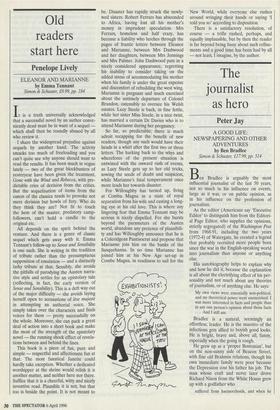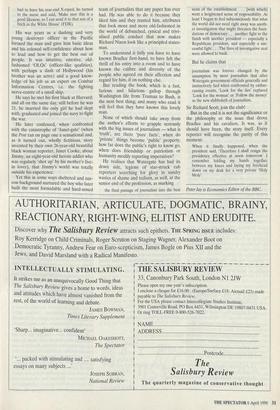The journalist as hero
Peter Jay
A GOOD LIFE: NEWSPAPERING AND OTHER ADVENTURES by Ben Bradlee Simon & Schuster, £17.99, pp. 514 Ben Bradlee is arguably the most influential journalist of the last 50 years, not so much in his influence on events, large as it was, or on public opinion, as in his influence on the profession of journalism.
As the editor (Americans say 'Executive Editor' to distinguish him from the Editori- al Page Editor, who supplies the opinions, strictly segregated) of the Washington Post from 1968-91, including the two years (1972-4) of Watergate, he created a legend that probably recruited more people born since the war in the English-speaking world into journalism than anyone or anything else.
His autobiography helps to explain why and how he did it, because the explanation is all about the electrifying effect of his per- sonality and not much about any theories of journalism, or of anything else. He says: My own views were essentially non-political, and my theoretical power went unexercised. I was more interested in facts and people than in any one person's opinion about those facts . . . And I still am.
Bradlee is a natural, seemingly an effortless, leader. He is the maestro of the infectious grin allied to boyish good looks. He is bright, brave and, above all, funny, especially when the going is rough.
He grew up as a 'proper Bostonian', but on the non-sunny side of Beacon Street, with fine old Brahmin relations, though his own immediate family were poor because the Depression cost his father his job. The man whose craft and nerve later drove Richard Nixon from the White House grew up with a godfather who
suffered from haemorrhoids, and when he
had to have his rear-end X-rayed, he turned to the nurse and said, 'Make sure this is a good likeness, so I can send it to that son of a bitch in the White House' (FDR).
His war years as a dashing and very young destroyer officer in the Pacific formed the man and gave him basic ideas and his colossal self-confidence about how to lead and how to get the best out of people. It was intuitive, emotive, old- fashioned `OLOs' (officer-like qualities), with perhaps a dash of Hollywood (his brother was an actor) and a good know- ledge of his job as an expert on Combat Information Centres, i.e. the fighting nerve-centre of a small ship.
He says he met his first black at Harvard; and all on the same day, still before he was 21, he married the only girl he had slept with, graduated and joined the navy to fight the war.
He later confessed, when confronted with the catastrophe of 'Janet-gate' (when the Post ran on page one a sensational and, as it turned out, wholly fictitious, story invented by their own 26-year-old beautiful black woman reporter, Janet Cooke, about Jimmy, an eight-year-old heroin addict who was regularly 'shot up' by his mother's live- in lover), that Jimmy's world was totally outside his experience.
Yet this in some ways sheltered and nar- row background nurtured the boy who later built the most formidable and hard-nosed team of journalists that any paper has ever had. He was able to do it because they liked him and they trusted him, attributes that look more and more old-fashioned in the world of debauched, cynical and trivi- alised public conduct that now makes Richard Nixon look like a principled states- man.
To understand it fully you have to have known Bradlee first-hand, to have felt the thrill of his entry into a room and to have known the calibre and diversity of the people who agreed on their affection and regard for him, if on nothing else.
But reading the book, which is a fast, furious and hilarious gallop through Washington life from Truman to Bush, is the next best thing; and many who read it will feel that they have known this lovely man.
None of which should take away from the author's efforts to grapple seriously with the big issues of journalism — what is `truth', are there 'pure facts', when do `private' things become 'public' property, how far does the public's right to know go, when does friendship or patriotism or humanity modify reporting imperatives?
He realises that Watergate has had its down side, legions of star-struck cub reporters searching for glory in sundry wastes of shame and tedium, as well, at the senior end of the profession, as marking seats of the establishment . . . [with which] went a heightened sense of responsibility. At least I began to feel subconsciously that what the world did not need right away was anoth- er investigation that might threaten the foun- dations of democracy . . . another fight to the finish with another president — especially a Republican president, and especially a suc- cessful fight . . . The fires of investigative zeal were allowed to bank.
But he claims that journalism was forever changed by the assumption by most journalists that after Watergate government officials generally and instinctively lied when confronted by embar- rassing events. 'Look for the lies' replaced `Look for the woman' or 'Follow the money' as the new shibboleth of journalism.
Sir Richard Scott, join the club!
But in the end it is not the significance or the philosophy or the issue that drove Bradlee and his cavaliers. It was, as it should have been, the story itself. Every reporter will recognise the purity of this moment: When it fmally happened, when the president said, 'Therefore I shall resign the presidency effective at noon tomorrow' I remember folding my hands together between my knees and laying my forehead down on my desk for a very private 'Holy Moly'.



























































 Previous page
Previous page